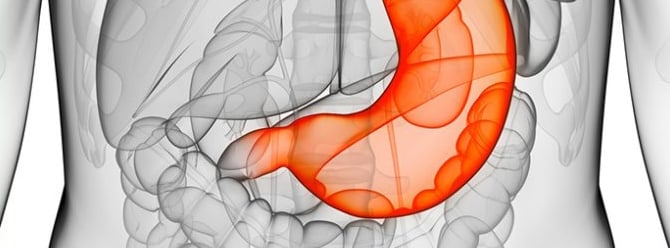Gastroparesis is a syndrome that results from delayed emptying of the stomach in the absence of a mechanical obstruction. It can be a very challenging problem with typical symptoms of nausea (93%), early satiety (60-86%), vomiting after meals (68—84%), bloating, and with upper abdominal pain (46-90%). The overall prevalence of gastroparesis is 9.6 per 100,000 men and 38 per 100,000 women. Motility of the stomach and gastrointestinal tract requires coordination of the nervous system, smooth muscles of the gut and specialized “pacemaker cells” known as interstitial cells of Cajal. These pacemaker cells play an important role of the synchronization of contractions of the stomach.
The most commonly recognized cause of gastroparesis is diabetes; both type 1 and type 2. Population studies report symptoms of gastroparesis in 11 to 18% of diabetic individuals. Both the autonomic nervous system and the interstitial cells of Cajal appear disrupted in diabetics with gastroparesis. A second category is viral infection. For reasons not entirely clear, some individuals have gastroparesis after viral illness for up to one year after the infection runs its course. These include Norwalk and Rotavirus, cytomegalovirus, Epstein-Barr virus (mononucleosis) and varicella-zoster (chicken pox and shingles). Neurologic diseases e.g. Multiple sclerosis or Parkinson’s and autoimmune diseases e.g. lupus are sometimes associated with gastroparesis. The majority of people however, does not have a defined diagnosis and are considered idiopathic. Approximately one-half of individuals with gastroparesis have no detectable underlying cause.
On occasion, medications can interfere with stomach emptying e.g.:
- Clonidine (used for blood pressure)
- Calcium channel blockers (used for blood pressure)
- Tricyclic antidepressants i.e., amitriptyline
- Anti-cholinergic medications e.g. for bladder spasms
The goal of evaluation is to first be sure there is no mechanical obstruction. This can require an upper endoscopy, CT scan or MRI enterography. If obstruction is excluded, assessing gastric motility is essential. This is done using scintigraphic studies that require an individual eat an egg white meal labeled with an isotope (usually technetium 99m) and scan the stomach up to 4-hours after the ingestion. Anyone with residual isotope in their stomach at a minimum of 2 and up to 4 hours likely has some element of gastroparesis. Emerging techniques, usually done at larger tertiary care centers might also include a wireless motility capsule that takes pictures as it transits the gut and Carbon 13 breath testing.
The most important management is dietary modification. Typically this involves smaller, more frequent meals up to 4-5 times/day, with moderation of processed foods, sugar and flour, and fatty foods which are known to delay gastric emptying. Blenderizing meals can help for those individuals intolerant of solid foods. Avoiding carbonated beverages can reduce distention. Alcohol and smoking are also both known to effect gastric emptying. Slow and incremental addition of soluble fiber e.g. legumes, oats, fruits e.g. apricots, grapefruits, mangoes, and oranges. Good vegetable sources include root veggies e.g. sweet potatoes and carrots, and the Brassica e.g. Brussel sprouts and turnips and ground flaxseed. While there is not any much clinical research at this time, I sometimes recommend plant-based digestive enzymes with meals to help better digest food. For individuals with diabetes good glycemic control is important.
Prokinetic medication e.g. metoclopramide in a liquid formulation taken 10-15 minutes before meals has been most widely studied. Erythromycin has also been demonstrated to have some pro-kinetic activity. Lastly, electrical stimulation might be a consideration if all else has been ineffective and usually considered as “palliative” management.
REFERENCES:
Camilleri M, Parkman HP, Shafi MA, et al. Clinical Guideline: management of gastroparesis. Am J Gastroenterol 2013; 108:18
Expert Opin Investig Drugs. 2017 Mar;26(3):331-342. Investigational drug therapies for the treatment of gastroparesis. Sanger GJ, Pasricha PJ
Expert Rev Gastroenterol Hepatol. 2016 Jul;10(7):817-25. Emerging strategies for the treatment of gastroparesis. Langworthy J, Parkman H, Schey R
Curr Opin Gastroenterol. 2015 Nov;31(6):499-505 Gastroparesis. Tack J, Carbone F, Rotondo A
